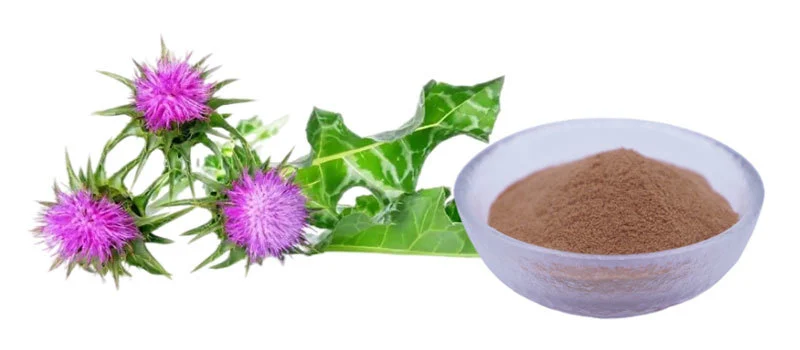Silymarin Powder Role in Anti-Inflammatory and Antiviral Studies
Silymarin powder, derived from the milk thistle plant (Silybum marianum), has garnered significant attention in recent years for its potential anti-inflammatory and antiviral properties. This powerful extract, standardized to contain 80% silymarin, is a complex mixture of flavonolignans, including silybin, silydianin, and silychristin. As researchers delve deeper into the mechanisms of action of silymarin powder, its role in combating inflammation and viral infections has become increasingly apparent. Studies have shown that silymarin powder can modulate various cellular pathways, potentially offering protection against oxidative stress, inflammation, and viral replication. This blog post explores the current understanding of silymarin powder's role in anti-inflammatory and antiviral studies, shedding light on its therapeutic potential and possible clinical applications in disease management.

How Silymarin Powder Reduces Inflammation Through Cellular Pathway Modulation
NF-κB Pathway Inhibition
Silymarin powder has demonstrated a remarkable ability to reduce inflammation by modulating the NF-κB pathway, a key regulator of inflammatory responses. Research has shown that silymarin powder can inhibit the activation and nuclear translocation of NF-κB, thereby suppressing the production of pro-inflammatory cytokines and enzymes. This mechanism is particularly important in chronic inflammatory conditions, where persistent NF-κB activation contributes to tissue damage and disease progression. By targeting this pathway, silymarin powder offers a promising approach to managing inflammation in various disorders, including liver diseases, arthritis, and inflammatory bowel diseases.
Antioxidant Defense Enhancement
One of the primary mechanisms by which silymarin powder exerts its anti-inflammatory effects is through the enhancement of antioxidant defenses. Silymarin powder has been shown to increase the production of endogenous antioxidants, such as glutathione, and to scavenge free radicals directly. This dual action helps to neutralize oxidative stress, which is a major contributor to inflammation. By bolstering the body's antioxidant capacity, silymarin powder can mitigate cellular damage, reduce inflammatory signaling, and protect against oxidative stress-induced inflammation. This antioxidant enhancement is particularly beneficial in conditions characterized by high levels of oxidative stress, such as liver diseases and neurodegenerative disorders.
Inflammatory Mediator Suppression
Silymarin powder has demonstrated the ability to suppress the production and activity of various inflammatory mediators. Studies have shown that silymarin powder can inhibit the production of prostaglandins, leukotrienes, and pro-inflammatory cytokines such as TNF-α, IL-1β, and IL-6. Additionally, silymarin powder has been found to modulate the activity of enzymes involved in the inflammatory process, including cyclooxygenase-2 (COX-2) and inducible nitric oxide synthase (iNOS). By targeting these inflammatory mediators, silymarin powder can effectively reduce inflammation at multiple levels, offering a comprehensive approach to managing inflammatory conditions. This multi-faceted action makes silymarin powder a promising candidate for the development of anti-inflammatory therapies.
Antiviral Effects of Silymarin Powder in Viral Infection Studies
Inhibition of Viral Entry and Replication
Silymarin powder has shown promising antiviral effects in various studies, particularly in its ability to inhibit viral entry and replication. Research has demonstrated that silymarin powder can interfere with the attachment and penetration of viruses into host cells, effectively preventing the initial stages of viral infection. Furthermore, silymarin powder has been found to inhibit the replication of several viruses, including hepatitis C virus (HCV), influenza A virus, and human immunodeficiency virus (HIV). The mechanism of action involves the disruption of viral protein synthesis and the modulation of host cell signaling pathways essential for viral replication. By targeting these critical steps in the viral life cycle, silymarin powder offers a potential therapeutic approach for managing viral infections.
Enhancement of Host Immune Response
Another significant aspect of silymarin powder's antiviral effects is its ability to enhance the host immune response. Studies have shown that silymarin powder can stimulate the production of interferons, which are crucial components of the innate antiviral immune response. Additionally, silymarin powder has been found to modulate the activity of natural killer cells and T lymphocytes, key players in the adaptive immune response against viral infections. This immunomodulatory effect of silymarin powder not only helps in combating ongoing viral infections but also potentially enhances the body's overall resistance to future viral challenges. The ability of silymarin powder to boost the immune system makes it a valuable adjunct in the management of viral infections and immune-related disorders.
Protection Against Viral-Induced Oxidative Stress
Silymarin powder plays a crucial role in protecting cells against viral-induced oxidative stress, which is a common consequence of viral infections. Many viruses, including HCV and HIV, are known to induce oxidative stress as part of their pathogenic mechanisms. Silymarin powder, with its potent antioxidant properties, can neutralize the excess free radicals generated during viral infections, thereby reducing cellular damage and inflammation. This protective effect is particularly important in chronic viral infections, where persistent oxidative stress can lead to tissue damage and disease progression. By mitigating oxidative stress, silymarin powder not only helps in managing the immediate effects of viral infections but also potentially reduces the long-term complications associated with chronic viral diseases.
Therapeutic Potential and Clinical Applications of Silymarin Powder in Disease Management
Liver Disease Treatment
One of the most well-established therapeutic applications of silymarin powder is in the treatment of liver diseases. Numerous clinical studies have demonstrated the efficacy of silymarin powder in managing various liver disorders, including alcoholic liver disease, non-alcoholic fatty liver disease, and viral hepatitis. The hepatoprotective effects of silymarin powder are attributed to its antioxidant, anti-inflammatory, and antifibrotic properties. In patients with chronic liver diseases, silymarin powder has been shown to improve liver function tests, reduce liver inflammation, and potentially slow the progression of fibrosis. Moreover, silymarin powder has demonstrated synergistic effects when used in combination with conventional liver treatments, suggesting its potential as an adjunct therapy in liver disease management.
Cancer Prevention and Adjuvant Therapy
Emerging research suggests that silymarin powder may have significant potential in cancer prevention and as an adjuvant therapy in cancer treatment. Studies have shown that silymarin powder possesses anticarcinogenic properties, including the ability to inhibit cell proliferation, induce apoptosis in cancer cells, and suppress angiogenesis. In clinical settings, silymarin powder has been investigated as a supportive therapy to reduce the side effects of chemotherapy and radiation therapy. For instance, silymarin powder has shown promise in protecting against chemotherapy-induced hepatotoxicity and reducing radiation-induced dermatitis. While more research is needed to fully elucidate its role in cancer management, the current evidence suggests that silymarin powder could be a valuable addition to integrative cancer care approaches.
Neurodegenerative Disease Management
The therapeutic potential of silymarin powder extends to the management of neurodegenerative diseases, such as Alzheimer's and Parkinson's disease. The neuroprotective effects of silymarin powder are attributed to its antioxidant and anti-inflammatory properties, as well as its ability to modulate neurotransmitter systems. Studies have shown that silymarin powder can reduce oxidative stress in the brain, inhibit the formation of amyloid plaques, and protect neurons from damage. In animal models of neurodegenerative diseases, silymarin powder has demonstrated the ability to improve cognitive function and reduce neuroinflammation. While clinical studies in humans are still limited, the preclinical evidence suggests that silymarin powder could be a promising therapeutic agent for neurodegenerative disorders, potentially slowing disease progression and improving quality of life for patients.
Conclusion
Silymarin powder has emerged as a promising natural compound with significant anti-inflammatory and antiviral properties. Its ability to modulate cellular pathways, enhance antioxidant defenses, and inhibit viral replication makes it a versatile therapeutic agent. From liver disease treatment to potential applications in cancer prevention and neurodegenerative disease management, silymarin powder offers a wide range of clinical possibilities. As research continues to uncover its mechanisms of action and therapeutic potential, silymarin powder is poised to play an increasingly important role in integrative medicine and disease management strategies.
At Avans NutriHealth Co., Ltd., we are committed to providing high-quality silymarin powder to support research and product development in these promising areas. As a leading manufacturer and supplier of plant extracts and nutritional supplements in China, we offer standardized silymarin powder with 80% content, backed by rigorous quality control and comprehensive certifications. Our expertise in extraction methods, formulation, and regulatory compliance ensures that we can meet the diverse needs of our clients in the pharmaceutical, nutraceutical, and cosmetic industries. For more information on our silymarin powder and other products, please contact us at Lillian@avansnutri.com.
FAQ
Q: What is silymarin powder?
A: Silymarin powder is a concentrated extract derived from milk thistle seeds, standardized to contain 80% silymarin, a complex of flavonolignans with potent antioxidant and hepatoprotective properties.
Q: How does silymarin powder reduce inflammation?
A: Silymarin powder reduces inflammation by inhibiting the NF-κB pathway, enhancing antioxidant defenses, and suppressing the production of inflammatory mediators.
Q: What are the antiviral effects of silymarin powder?
A: Silymarin powder exhibits antiviral effects by inhibiting viral entry and replication, enhancing the host immune response, and protecting against viral-induced oxidative stress.
Q: Can silymarin powder be used in liver disease treatment?
A: Yes, silymarin powder has shown efficacy in managing various liver disorders, including alcoholic liver disease, non-alcoholic fatty liver disease, and viral hepatitis.
Q: Is silymarin powder beneficial in cancer treatment?
A: Emerging research suggests silymarin powder may have potential in cancer prevention and as an adjuvant therapy to reduce side effects of conventional cancer treatments.
References
1. Agarwal, R., Agarwal, C., Ichikawa, H., Singh, R. P., & Aggarwal, B. B. (2006). Anticancer potential of silymarin: from bench to bed side. Anticancer Research, 26(6B), 4457-4498.
2. Polyak, S. J., Ferenci, P., & Pawlotsky, J. M. (2013). Hepatoprotective and antiviral functions of silymarin components in hepatitis C virus infection. Hepatology, 57(3), 1262-1271.
3. Surai, P. F. (2015). Silymarin as a natural antioxidant: an overview of the current evidence and perspectives. Antioxidants, 4(1), 204-247.
4. Loguercio, C., & Festi, D. (2011). Silybin and the liver: from basic research to clinical practice. World Journal of Gastroenterology, 17(18), 2288-2301.
5. Borah, A., Paul, R., Choudhury, S., Choudhury, A., Bhuyan, B., Das Talukdar, A., ... & Mohanakumar, K. P. (2013). Neuroprotective potential of silymarin against CNS disorders: insight into the pathways and molecular mechanisms of action. CNS Neuroscience & Therapeutics, 19(11), 847-853.
6. Wagoner, J., Negash, A., Kane, O. J., Martinez, L. E., Nahmias, Y., Bourne, N., ... & Polyak, S. J. (2010). Multiple effects of silymarin on the hepatitis C virus lifecycle. Hepatology, 51(6), 1912-1921.



